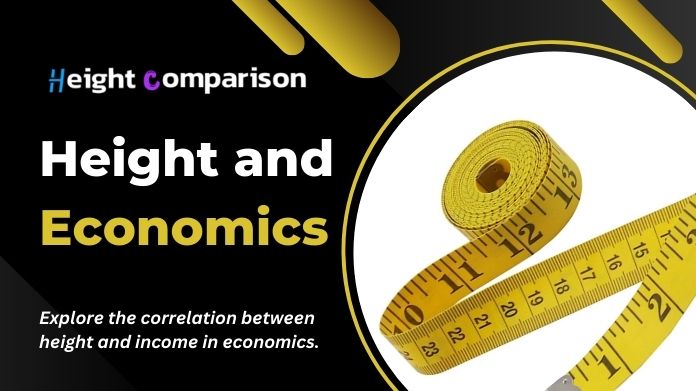Height has long been a subject of curiosity and fascination in various aspects of life, including its perceived impact of height and economics outcomes such as income and career success.
While height is primarily a biological trait determined by genetics and early-life nutrition, its influence extends beyond physical stature, potentially affecting social interactions, perceptions of competence, and workplace opportunities.
This Height Comparison article explores the complex relationship between height and economics, examining research findings, societal perceptions, and the implications for individuals and society.
The Perception of Height and Economics

From early childhood, height can influence how others perceive individuals. Taller individuals are often stereotyped as more assertive, competent, and capable of leadership roles.
These perceptions can start in school settings, where taller students may be perceived as natural leaders or more academically capable, leading to differential treatment and expectations from teachers and peers alike.
Similar biases persist in the workplace. Research has shown that taller individuals earn higher salaries than their shorter counterparts. A study published in the “Journal of Applied Psychology” in 2004 found that each inch of additional height correlated with an average increase in annual earnings of approximately $789 for American men.
This phenomenon, known as the height premium, suggests that taller individuals may have an advantage in negotiating higher salaries or gaining promotions.
Factors Influencing the Height Premium
Several factors contribute to the height premium observed in economic studies. One explanation lies in the perception of height as a proxy for desirable attributes such as competence, intelligence, and leadership potential.
Taller individuals may be seen as more authoritative and capable, traits that align with traditional notions of leadership and success in many organizational settings.
Moreover, height can affect interpersonal dynamics in subtle ways. Taller individuals may command more attention in social interactions, influencing decision-making processes and opportunities for career advancement.
Research indicates that taller individuals are more likely to be selected for management positions and executive roles, reflecting societal biases that equate physical stature with qualities essential for leadership.
Gender Differences in Height and Income
The relationship between height and income can vary by gender, adding another layer of complexity to the discussion. While height is generally associated with higher earnings for both men and women, the effect tends to be more pronounced among men.
Studies have consistently found that taller men earn more on average than shorter men, with estimates suggesting a significant income disparity based on height.
For women, the relationship between height and income is more complex. Research indicates that taller women may experience mixed effects on their earnings potential.
While taller women may benefit from some advantages associated with height, such as perceived competence and authority, they may also face challenges related to societal expectations of femininity and gender norms.
Psychological Mechanisms and Height Perception
Psychological mechanisms underpinning the height-income relationship include perceptions of competence, confidence, and assertiveness.
Taller individuals may exude greater self-assurance in professional settings, influencing how colleagues, clients, and superiors perceive them. This perceived confidence can contribute to higher evaluations, more opportunities for advancement, and, ultimately, higher salaries.
Furthermore, height may impact self-esteem and career aspirations from a young age. Research suggests taller individuals have higher self-esteem and more ambitious career goals than their shorter peers.
These psychological factors can reinforce the advantages of height, creating a cycle where height influences career outcomes through both external perceptions and internal motivations.
Cultural and Societal Influences
The impact of height on income and career success can also vary across different cultural contexts. The height premium may be more pronounced in cultures where height is highly valued or associated with social status.
Conversely, in societies where other attributes such as education or family background play a more significant role in determining success, the influence of height on economic outcomes may be less important.
Moreover, societal attitudes towards height and gender roles can intersect to shape career opportunities and income disparities. In patriarchal societies, for example, height may reinforce traditional gender norms that favor taller men in leadership positions while imposing different expectations on women based on their physical stature.
Addressing Height Bias in the Workplace
Recognizing the influence of height on economic outcomes raises essential questions about fairness and equality in the workplace. Height bias, like other forms of implicit bias, can perpetuate inequalities and limit opportunities for individuals who do not conform to societal expectations of physical appearance.
Organizations can proactively mitigate height bias and promote diversity and inclusion. Implementing transparent hiring and promotion practices, providing unconscious bias training for employees, and fostering a culture of meritocracy can create environments where individuals are evaluated based on their skills, qualifications, and contributions rather than physical attributes.
Conclusion
Height plays a nuanced role in shaping economic outcomes and influencing perceptions of competence, leadership potential, and earning capacity in the workplace.
While height alone does not determine success, societal biases and psychological mechanisms contribute to a height premium that can impact career trajectories and income disparities.
Understanding height and economics dynamics is essential for promoting fairness and equity in professional settings, where merit should prevail over physical appearance.
As we continue to explore the complex interplay between height and economics, it is crucial to challenge stereotypes, promote inclusivity, and create opportunities for individuals of all heights to thrive based on their talents and abilities.
By fostering environments that value diversity and celebrate individual strengths, we can work towards a future where success is measured not by physical stature but by the contributions and achievements of each individual in the workplace and beyond.






